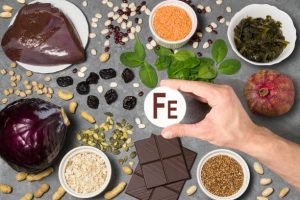Spinach is often touted as a good source of iron, but there are factors that can affect the absorption of iron from spinach. Here is a detailed explanation about spinach’s ability to provide iron and how to enhance iron absorption:
- 1. Iron content in spinach: Spinach is indeed a good source of iron, with approximately 2.7 milligrams of iron per 100 grams of spinach. This can be helpful in meeting daily iron requirements.
- 2. Non-heme iron: The iron found in spinach is known as non-heme iron, which is different from the heme iron found in animal foods. Non-heme iron has lower absorption rates, so it requires some measures to enhance its absorption.

Food rich in ferrum. Credit: iStock by GettyImage - 3. Role of vitamin C: Vitamin C helps convert non-heme iron into a more absorbable form. Therefore, consuming spinach with foods rich in vitamin C can enhance iron absorption. For example, you can pair spinach with citrus fruits, strawberries, tomatoes, and bell peppers.
- 4. Oxalic acid in spinach: Spinach contains relatively high levels of oxalic acid, which can bind with iron to form insoluble compounds, making it more difficult for the body to absorb iron. Cooking spinach can help reduce the oxalic acid content, thus improving iron absorption.
- 5. Other influencing factors: Apart from oxalic acid, phytic acid found in spinach and other plant-based foods can also affect iron absorption. Phytic acid can bind with iron and reduce its absorption rate. Additionally, substances like calcium and caffeine may also impact iron absorption. Therefore, it is advisable to avoid consuming these substances simultaneously with spinach.
In summary, spinach is a good source of iron, but its non-heme iron has lower absorption rates. To enhance iron absorption, you can consume spinach with foods rich in vitamin C and reduce oxalic acid content through cooking. Additionally, be mindful of avoiding simultaneous intake of substances that may affect iron absorption.
If you have concerns about your iron intake, it is best to consult a healthcare professional or a registered dietitian who can provide personalized advice based on your specific needs and dietary preferences.

